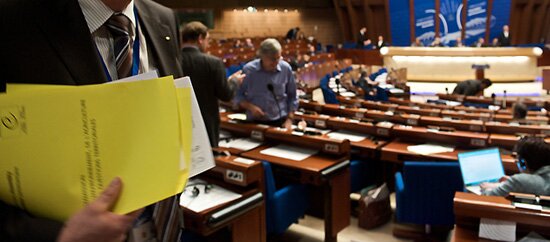
Committee meetings
Although committees deal in particular with reports, they have great freedom to discuss any matter within their competence when they agree to do so. They organise hearings, colloquies or conferences on particular subjects, the findings of which can then be used for the preparation of reports to the Assembly.
Sessions and sittings
The sessions of the Parliamentary Assembly are divided into four part-sessions, each lasting for about a week at the end of January, April, June and the beginning of October.
Seating
Seats allocated to members in the Chamber are arranged in the shape of a horseshoe and allocated in alphabetical order. Consequently members do not sit in national delegations or in political groups.
Official and working languages
According to the Statute, the official languages of the Council of Europe are English and French. However, the Assembly provides interpretation in German, Italian and Russian as additional working languages.
The Table Office
The Table Office advises members of the Assembly, secretaries of delegations, of political groups and other officials on how best to achieve their objectives within the Rules of Procedure and serves as custodian of these rules.
Debates
The Assembly’s plenary debates are held in public while committees meet generally in camera. The debates are conducted according to the principles observed in national parliaments.
Voting
Only members duly designated by the national delegation and who have signed the register of attendance for the specific sitting shall be entitled to vote. The Assembly normally votes by using the electronic voting system.
Majorities
A two-thirds majority is required for questions such as a draft recommendation or draft opinion to the Committee of Ministers or the adoption of urgent procedure. In respect of a draft resolution and any other decision, a majority of the votes cast is required.
